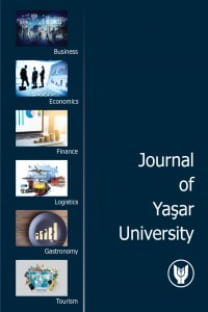Seçilmiş Finansal ve Makroekonomik Değişkenler ile Tüketici Gücen Endeksi Arasındaki İlişkinin Analizi
Tüketici Güven Endeksi, Makroekonomik değişkenler, FinansalDeğişkenler
The Relationship Between Selected Financial and Macroeconomic Variables with Consumer Confidence Index
___
- Afshar, T.,Arabian, G., & Zomorrodian, R. 2007. “Stock return, consumer confidence, purchasing manager’s index and economic fluctuations”. Journal of Business & Economics Research, 5(8): 97-106Arısoy, İ. 2012. “Türkiye Ekonomisinde İktisadi Güven Endeksleri ve Seçilmiş Makro Değişkenler Arasındaki İlişkilerin VAR Analizi”. Maliye Dergisi, 162, 304-315. Bildirici, M., & Bozoklu, Ü. 2010. “Beklentilerin Ekonomi Uzerine Etkileri: MS-VAR Yaklasimi”. TÜSİAD-Koç University Economic Research Forum working paper series.Bozkurt H., 2007. Zaman Serileri Analizi, Ekin Basım Yayın, BURSA.Central Bank of Turkey 2018, EVDS, https://evds2.tcmb.gov.tr/index.php?/evds/serieMarketDees, S., & Brinca, P. S. 2013. “Consumer confidence as a predictor of consumption spending: Evidence for the United States and the Euro area”. International Economics, 134, 1-14.Eyüboğlu, S., & Eyüboğlu, K. 2018. “Reel Kesim Güven Endeksi ile Borsa İstanbul Sektör Endeksleri Arasındaki İlişkinin Test Edilmesi”. Business & Economics Research Journal, 9(1):75-86Garner, C. A. 1991. “Forecasting consumer spending: Should economists pay attention to consumer confidence surveys?”. Economic Review, 763: 57-71.Granger, C. W. 1969. “Investigating causal relations by econometric models and cross-spectral methods”. Econometrica: Journal of the Econometric Society: 37 (3) 424-438.Kale, S., & Akkaya, M. 2016. “The relation between confidence climate and stock returns: The case of Turkey”. Procedia economics and finance, 38: 150-162.Katona G.1975 Psychological economics. New York: Elsevier Scientific Publishing Company.Korkmaz, T., & Çevik, E. İ. 2009. “Reel Kesim Güven Endeksi ile İMKB 100 Endeksi arasındaki dinamik nedensellik ilişkisi”. Istanbul University Journal of the School of Business Administration, 38(1):24-37Møller, S. V., Nørholm, H., & Rangvid, J. 2014. “Consumer confidence or the business cycle: What matters more for European expected returns?”. Journal of Empirical Finance, 28: 230-248.Özgen, F. B. ve B. Güloglu 2004, “Türkiye'de İç Borçların İktisadi Etkilerinin VAR Tekniği ile Analizi”, METU Studies in Development, 3: 93-114.Topuz, Y. V. 2011. “Tüketici Güveni ve Hisse Senedi Fiyatları Arasındaki Nedensellik İlişkisi: Türkiye Örneği. AİBÜ-İİBF Ekonomik ve Sosyal Araştırmalar Dergisi”, 7 (1): 53-65.TSI 2018, http://www.tuik.gov.tr/PreHaberBultenleri.do?id=27864 Usul, H., Küçüksille, E., & Karaoğlan, S. 2017. “Güven endekslerindeki değişimlerin hisse senedi piyasalarına etkileri: Borsa İstanbul Örneği”. Suleyman Demirel University Journal of Faculty of Economics & Administrative Sciences, 22(3): 685-695
- ISSN: 1305-970X
- Başlangıç: 2006
- Yayıncı: Yaşar Üniversitesi
Reel Döviz Kurlarının Fourier Durağanlık Analizi ile Test Edilmesi
Blokzincir Üzerine Kavramsal Bir Öneri: İşletme likiditesi dağıtık kayıt defteri
Çağatay BAŞARIR, İbrahim Murat BİCİL, Özer YILMAZ
Korumacılık Sonrası Endüstri-İçi Ticaret Değişti mi?: Amerikan Otomotiv Endüstrisinin Durumu
Gülçin Elif YÜCEL, Ayfer USTABAŞ
1988-2017 Dönem Aralığı İçin Türkiye’de Mali Sürüklenme Etkisinin İncelenmesi ve Değerlendirilmesi
Selçuk Çağrı ESENER, Burak DARICI, Umutcan MEMO
Sosyal Medya Karmasının Marka Değiştirme Eğilimi Üzerindeki Etkisi: Risk Algısının Aracı Rolü
